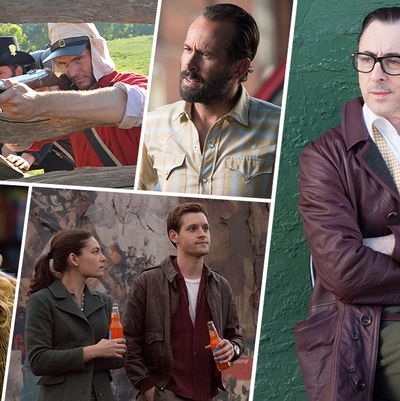
Amazon Studios is once again bringing the public into its version of “pilot season,” putting sample episodes of new series online simultaneously and factoring public and critical reaction into its decision of which ones to order as full series. Here are some quick reactions to the new batch of scripted (and, in one case, partly scripted) pilots:
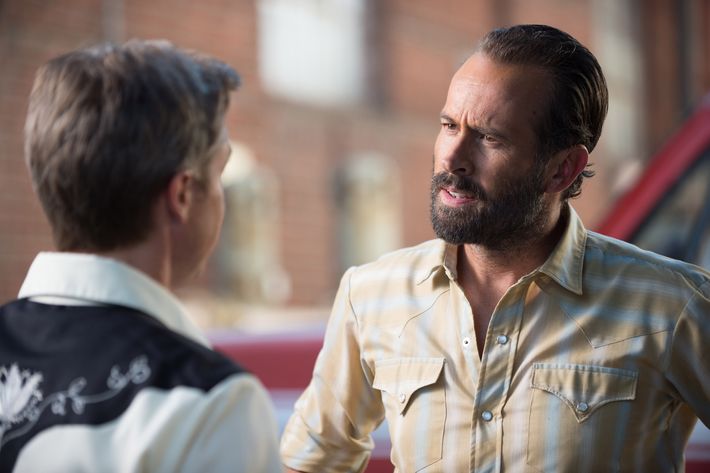
Cocked
Co-created by writers Samuel Baum (Lie to Me) and Sam Shaw (Manhattan), this comedy-drama about a struggling family-owned gun manufacturer feels like a wannabe-daring premium-cable show. It’s not without a certain intelligence and sass, but it tries way too hard to be edgy and “politically incorrect,” and it can’t seem to figure out what to do with its female characters, who tend to be nags, generic tough chicks, troubled floozies, or nonentities. Brian Dennehy plays Wade Paxson, the patriarch of Paxson Firearms, which is getting stomped in the marketplace by Rayburn, a company founded by Wade’s estranged brother. Wade’s ne’er-do-well eldest son, Grady (Jason Lee), is a smarmy know-it-all and an addict who went through rehab but secretly snorts cocaine with prostitutes; he spent $18 million developing a semiautomatic revolver that he hoped would rescue the company, only to see it stolen and rushed into the marketplace by their rival. Grady’s responsible younger brother Richard (Sam Trammell) abandons a potential partnership at a PR firm and risks the censure of his liberal family to save the day; complications ensue, as they say.
As directed by Jordan Vogt-Roberts (of You’re the Worst and a lot of Funny or Die shorts), Cocked strives for the sort of over-the-top, verging-on-satire shenanigans that enlivened Thank You for Smoking (book and film). The show blithely chalks up massacres and firearm accidents as the cost of doing business, which gives it a disreputable charge and will probably endear it to gun aficionados and Second Amendment absolutists, but there’s something too calculated about it, as if it can’t quite summon the level of callousness required to be truly shocking and challenging.
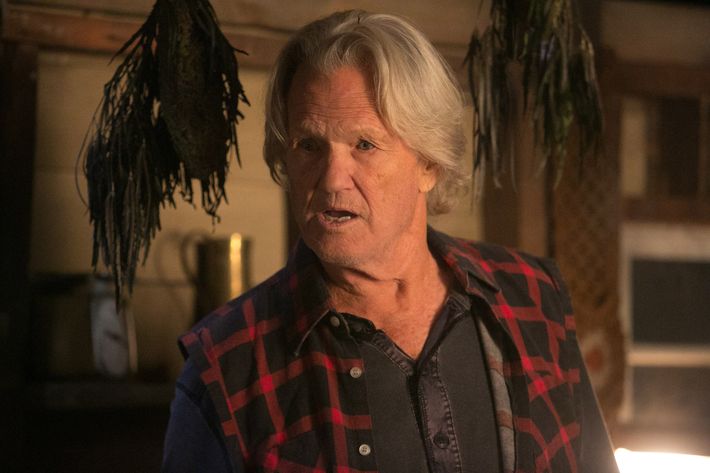
Down Dog
Not the first series to be shamelessly enamored with Boogie Nights’ Candide-as-dimwit-stud story line, this one follows the misadventures of yoga instructor Logan Wood (played by Josh Casaubon of I Want My Pants Back). He’s a scion of hippies who’s described as having been “born stoned,” and who coasts through life on his Zen surfer-goofball charisma and natural sex appeal (the opening section makes much of his sexual prowess, which is at least partly signaled by his tactically shaggy, Warren Beatty–in-Shampoo haircut). A cast of very likable women play his supervisors, employees, and colleagues; the standout is Paget Brewster (of Criminal Minds), who does a lot with the frustratingly repetitive role of Logan’s boss at the studio. This one has a laid-back, patchouli-scented charm, and the CinemaScope-framed images of Southern California are pretty, but all in all, it feels less like a viable series than a movie idea extended beyond its natural dramatic lifespan.
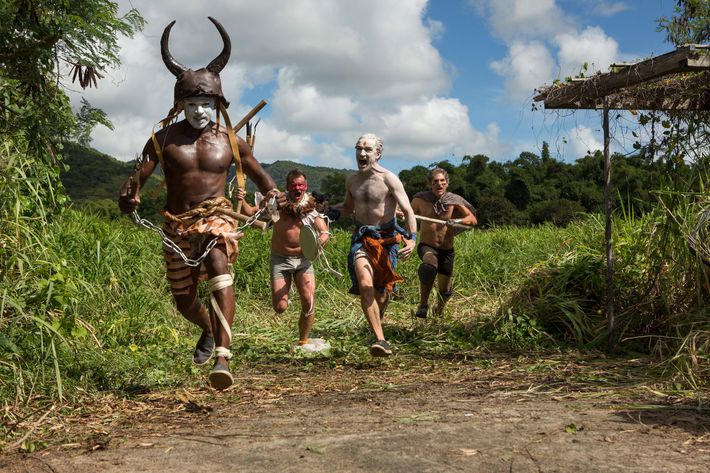
Mad Dogs
Based on a U.K. series created by Cris Cole (The Bill), this pilot doesn’t entirely persuade or entice — like Down Dog, above, it feels like it should’ve been a movie. But it’s the most tonally original offering from Amazon this year (with the possible exception of the New Yorker “magazine” show — see below), and the most imaginatively directed (by Charles McDougall of The Mindy Project). Steve Zahn, Romany Malco, Michael Imperioli, and Ben Chaplin play 40-something friends invited to Belize to stay with their old pal (Billy Zane), who has suddenly come into possession of a mansion by the sea. The man-boy revelry goes dark when Zane’s character evades basic questions about how he got the house and what he’s doing there in the first place. Soon enough, things take a turn for the weird/disturbing, with intimations of violence followed by a game of chicken between the host and some menacing locals who might or might not be drug dealers. The show’s view of Belize vacillates between astute and offensive: Sometimes it seems aghast at the mostly white characters’ Yankee entitlement, and other times it seems to revel in that same sensibility. But it sustains a fine mix of irony and menace, and makes excellent strategic use of silence.
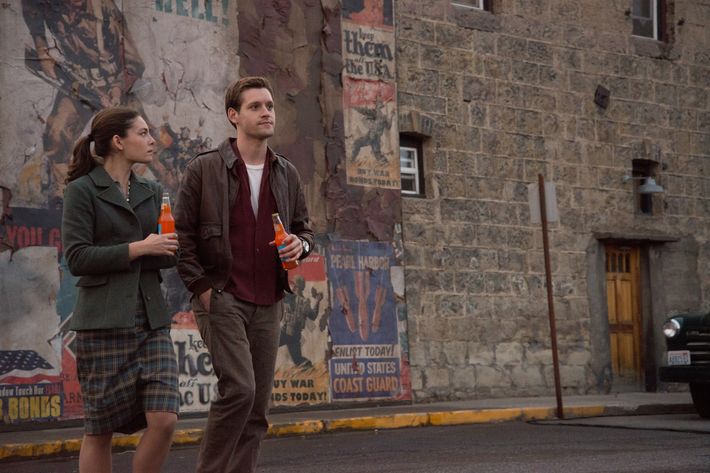
The Man in the High Castle
Based on Philip K. Dick’s 1962 sci-fi novel about life in an alternate-universe version of North America, in which the Axis Powers won World War II, this is the most fully imagined and fascinating of Amazon’s pilots. As adapted by The X-Files veteran Frank Spotnitz and directed by David Semel (Madam Secretary), this one boasts a handsome cobalt-and-whiskey color scheme and bizarro-world versions of Kennedy-era production design; the result simultaneously evokes House of Cards and Mad Men.
The pilot takes its sweet time laying out the show’s grim, paranoid universe. The East Coast is a Vichy, France–styled, craven protectorate of Germany, with jackbooted Nazi soldiers roaming New York City streets in search of saboteurs who want their pre-1940s America back; the middle part of the country is no man’s land, while the West Coast is the property of Imperial Japan. The plot finds rebel operatives Alexa Davalos (Mob City) and Luke Kleintank (Pretty Little Liars) secretly trying to undermine the baddies of the Reich while a Gestapo torturer (Rufus Sewell of Dark City) and a Japanese officer (Cary-Hiroyuki Tagawa of Rising Sun) slink around with tented fingers, plotting against the American resistance and each other’s occupying governments. If nothing else, Castle is a superlative example of world-building, and if it makes it to series, it’ll be catnip to detail-obsessed nerds, who’ll spend countless hours parsing the differences between the show and its source material, and speculating on whether Dick’s account of how World War II ended up going the other way seems plausible even as a hypothetical.
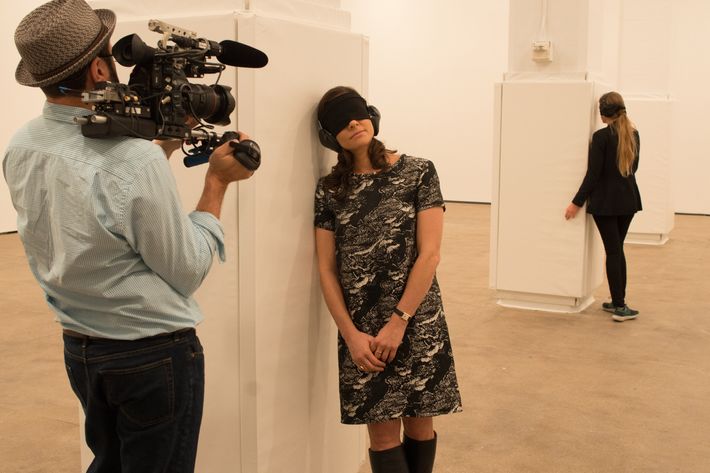
The New Yorker Presents
The nation’s most high-toned and literary weekly makes a go at translating its brand into a TV series, with mixed but fascinating results. As supervised by documentary filmmaker Alex Gibney (Taxi to the Dark Side; Enron: The Smartest Guys in the Room), this is a magazine series in the old-school, 60 Minutes sense of the term: an assortment of short and not-so-short bits that try to adapt various New Yorker standbys to video. The pilot opens with a “Shouts & Murmurs”–type sketch written by frequent New Yorker and Saturday Night Live contributor Simon Rich, in which a man played by Getting On’s Brett Gelman surreally terrorizes people outside of a supermarket, pausing occasionally to take performance notes from an unyielding adviser/director played by Alan Cumming. There are interstitial segments based on one-panel cartoons, a poem by Matthew Dickman read by actor Andrew Garfield, and a fascinating profile of performance artist Marina Abramovic by Ariel Levy. The highlight, though, is a short-ish documentary by Jonathan Demme about Berkeley biologist Tyrone Hayes, who was hired by the pesticide company Novartis (later Syngenta) to study the effects of the herbicide atrazine on tree frogs; when he found that the chemical messed with the frogs’ reproductive capabilities, he became the object of a systematic campaign to discredit him. Not every segment in this pilot quite works, but the whole is so original — such a breath of journalistic and televisual fresh air — that I’m eager to see them keep tinkering with the format until they perfect it.
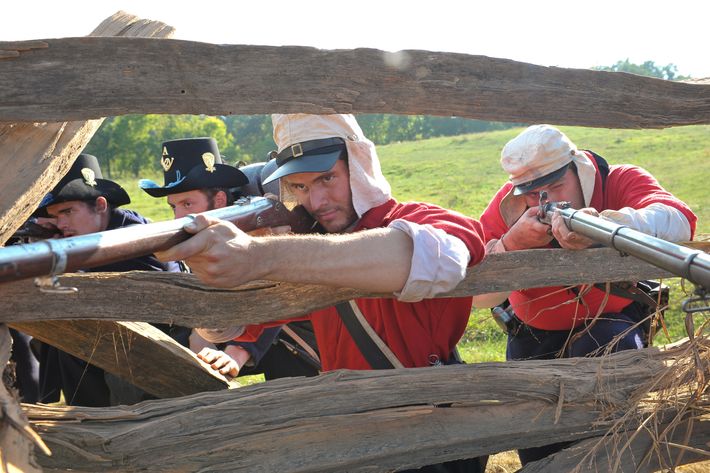
Point of Honor
Created by Lost’s Carlton Cuse, this is a Civil War soap opera that tells two parallel, sometimes intertwined stories. One’s about a couple of West Point buddies who find themselves on opposites sides of America’s bloodiest conflict; the other is about what happens when one of those soldiers, the son of a Virginia plantation owner, convinces his father to free the family’s slaves at the beginning of the conflict, sparking backlash among the local whites. As if the weak production values and 21st-century hair and makeup weren’t distracting enough, the show is filled with behavioral and political anachronisms that are hard to chalk up to dramatic license because they just seem like shameless pandering to modern liberal audiences. Like the fundamentally dishonest Mel Gibson Revolutionary War picture The Patriot, about a good-hearted plantation owner who freed his slaves a long time ago and was paying them a living wage, this show seems to want to dig into historical unpleasantness without getting its hands dirty. Between the racially enlightened attitudes and the splashes of post-’60s feminism, Point of Honor turns Civil War America into a theme park. Gone With the Wind seems tough-minded in comparison.
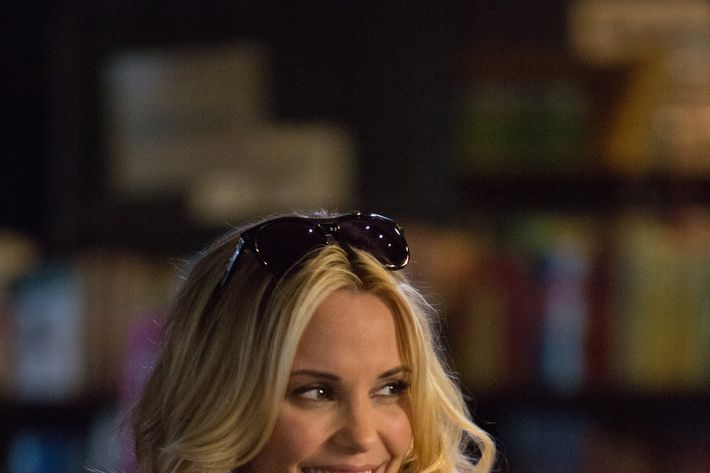
Salem Rogers
Leslie Bibb of About a Boy plays the title character, a 40-something ex-supermodel who reenters the world after years in rehab and tries to reclaim the spotlight by any means necessary. As overseen by Onion News Network producer Will Graham, newcomer Lindsey Stoddart (whose script was picked through Amazon’s open selection process), and Mean Girls director Mark Waters, this is an acidic comedy whose laughs are mainly dependent on shock value: Many of Salem’s lines have that Los Angeles anti-comedy quality typified by Sarah Silverman, insulting every conceivable minority group in creation while offering white viewers the psychic cushion of knowing that nobody involved with the show “really” believes that stuff. Once Salem foists herself on her polite and kindhearted former assistant Agatha (Saturday Night Live’s Rachel Dratch), who’s now the successful author of self-help books, the show becomes a buddy comedy about a soft-spoken superego who’s doing everything she can to keep a raging id monster in check. If you like Californication, you might like this show, and if you don’t, you probably won’t.


